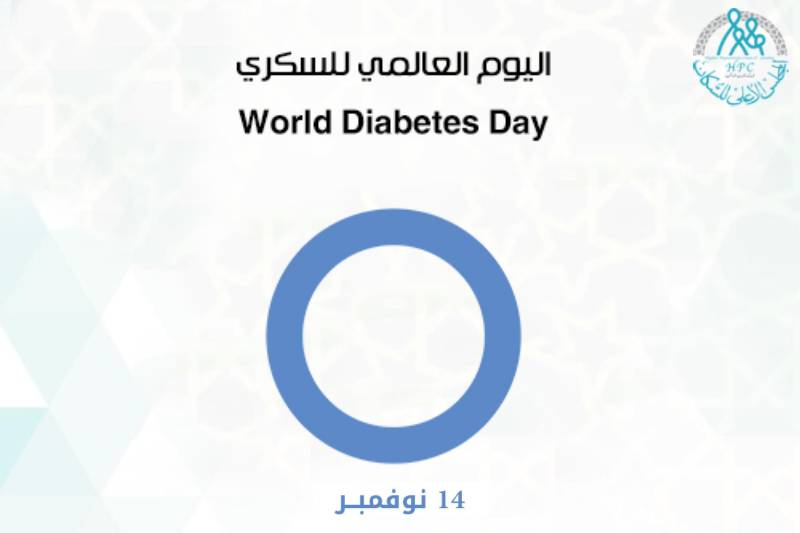

This Thursday, Jordan and the world celebrate World Diabetes Day, which falls on the 14th of November of each year. This year’s World Diabetes Day bears the slogan: "Family and Diabetes".
World Diabetes Day aims at raising awareness regarding the disease’s impact on families, especially as the impact of diabetes does not only fall on the individual affected, as the impact extends its reach to affect spouses and children. This year’s World Diabetes Day also aims at strengthening the role of the family in dealing with diabetes and its prevention due to the increasing spread of the disease. Therefore, awareness has become a necessity in order to reduce this disease’s resulting damages by educating the community about the disease and providing appropriate medical care to diabetics.
Diabetes is a disease that manifests by inhibiting the body’s ability to use glucose naturally. Glucose is vital for the functions of the body's cells and is the energy source for the body and the brain without which the body is unable to properly perform its functions. Moreover, and regardless of the fact that determining the type of diabetes depends primarily on the underlying cause, all types of diabetes eventually lead to elevated blood sugar levels, which consequently leads to a series of serious and dangerous health problems.
The HPC emphasized in a press release that its interest in this day comes within the framework of its policies to improve the qualitative characteristics of the population, and to reduce the spread of diabetes among the population because of its different implications on the health level of the people, their productivity and the spending on health sector in Jordan, especially as Jordan is undergoing demographic transition that requires from everyone to participate in the development process and not to be left behind.
The HPC also indicated that at the level of Jordan health indicators from various studies carried out by the Jordanian Ministry of Health in cooperation with the World Health Organization and the American Center for Disease Control indicate that the incidence of diabetes (in the case of fasting) continues to increase, rising from 6.8% in 1996 to 19.6% in 2016, in addition to the percentage of Prediabetes reached 23%. In addition, the risk factors for diabetes are also on the rise. The rates of overweight and obesity are of great concern, as more than 66% of people are overweight and obese, meaning that more than 2 million adults are at high risk of obesity, especially diabetes. More than 50% of citizens are not physically active; in addition to 50% of men and 6% of women are smokers, they start smoking at early age, 10% of them are obese. They start smoking from the age of 10 to 14 years, and 48% start smoking from the age of 15 to 18 years.
The HPC further added that kidney failure is the most common disease in patients with diabetes whereas the percentage is multiple by 10. Moreover, diabetics are three times more likely to develop cardiovascular disease and that diabetes is a major cause of blindness, heart attacks, strokes and lower limbs imputation.
It is noteworthy that there are three types of the most common diabetes; the first type is developed when the body fails to produce the Insulin Harmon, where in this case the patient must take an alternative synthetic Insulin. The second type is the most common type in diabetics, where Insulin production is normal, but the problem is the receptor response and the observations noted that this type is linked to obesity. The third type is Gestational diabetes that occurs in pregnant women during their pregnancy, where the body becomes less sensitive to insulin and this type of diabetes is usually cured post birth.
The World Health Organization (WHO) reports that there is a set of tips to reduce the chances of developing type 2 diabetes, in other words, having a healthy eating plan that is rich in nutrients that have low fat and calories. Hence, it simply means eating healthy foods in reasonable amounts and commitment to regular meal times. The World Health Organization (WHO) predicts that diabetes will rank seventh among the leading causes of death by 2030. Thus the prompt prevention, enhanced care, improved monitoring and raising awareness on the increase diabetes development is essential, in order to alleviate its enormous burden and huge consequences, especially in low- and middle-income countries.
The International Diabetes Federation selected the slogan of World Diabetes Day for 2019 to be a blue circle. The connotation of the blue color is to evoke the color of the sky that unifies all world nations and it is the color of the United Nations flag. Meanwhile, the circle is a symbol for unification, and stand for the solidarity of world diabetes community responding to Diabetes.
The idea of dedicating a specific and fixed day to raise awareness about Diabetes was presented on 1991 by The International Diabetes Federation and the WHO as a response to the emerging concerns about the escalated health threat imposed by Diabetes on communities all around the globe. Nowadays, Diabetes has an official day listed in the United Nations under its regulation No.61/225 since 2006. This date was selected in particular since it is the birth date of Frederick Grant Banting who co-discoverer insulin with Charles Best on 1922.







